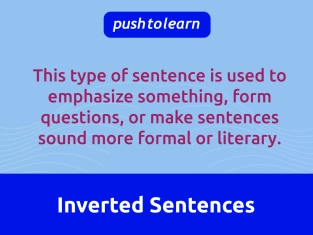by PushtoLearn
Inversión de los adverbios negativos en inglés
Tabla de contenidos
Ejercicios de Inversión Negativa
Estos ejercicios se enfocan en la Inversión Negativa
¿Qué es la Inversión Negativa?
La inversión negativa ocurre cuando una oración comienza con un adverbio negativo (por ejemplo: never, seldom, hardly) y se invierte el orden sujeto-verbo.
✅ Oración normal:
I have never been so tired.
✅ Con inversión:
Never have I been so tired.
Esta estructura hace que la oración suene más dramática, formal o persuasiva.

Cómo usar la Inversión Negativa
Never, Rarely, Seldom
Estos adverbios significan “no frecuentemente” o “casi nunca”. Se usan con el presente perfecto, pasado perfecto o verbos modales (can, could, etc.).
|
Oración normal |
Oración con inversión |
|
I have never seen such a big cake. |
Never have I seen such a big cake. |
|
She seldom visits her hometown. |
Seldom does she visit her hometown. |
|
They can rarely afford to travel. |
Rarely can they afford to travel. |
Hardly, Barely, Scarcely, No Sooner
Estas palabras describen un evento que ocurrió inmediatamente antes de otro. A menudo se usan con el pasado perfecto.
|
Oración normal |
Oración con inversión |
|
We had hardly started eating when the phone rang. |
Hardly had we started eating when the phone rang. |
|
She had no sooner left than it started raining. |
No sooner had she left than it started raining. |
|
He had barely spoken when the teacher interrupted him. |
Barely had he spoken when the teacher interrupted him. |
🔹 Nota:
Hardly, barely, scarcely van seguidos de when.
No sooner va seguido de than.
Only + Expresiones de Tiempo
Expresiones como only after, only when, only later requieren inversión.
|
Oración normal |
Oración con inversión |
|
I realised the mistake only after I submitted the form. |
Only after I submitted the form did I realise the mistake. |
|
They discovered the truth only later. |
Only later did they discover the truth. |
Frases con "No" y "Not"
Frases como under no circumstances, in no way, on no account requieren inversión.
|
Oración normal |
Oración con inversión |
|
You should not enter under any circumstances. |
Under no circumstances should you enter. |
|
We did not agree to this in any way. |
In no way did we agree to this. |
"Little" para Restricción
"Little" en la inversión negativa indica que alguien no estaba al tanto de algo.
|
Oración normal |
Oración con inversión |
|
She did not know she would become famous. |
Little did she know she would become famous. |
|
People do not realise how hard it is. |
Little do people realise how hard it is. |
Errores Comunes en la Inversión Negativa
❌ Incorrecto: Never I have seen such a thing.
✅ Correcto: Never have I seen such a thing.
❌ Incorrecto: Hardly I had finished my homework when my mom called.
✅ Correcto: Hardly had I finished my homework when my mom called.
❌ Incorrecto: Only after he left, I understood.
✅ Correcto: Only after he left did I understand.
Uso Cotidiano de la Inversión Negativa
Aunque la inversión negativa es mayormente formal, puede usarse en conversaciones cotidianas para contar historias o dar énfasis.
✅ Conversación informal:
“Never have I seen such a beautiful sunset!”
“Little did she know that her life was about to change.”
✅ Discurso/escritura formal:
“Under no circumstances should this policy be ignored.”
“No sooner had he arrived than the meeting began.”
También puede ser útil revisar las lecciones sobre Cleft Sentences y Fronting.
FAQs sobre la Inversión Negativa
¿Qué es la inversión negativa en inglés?
La inversión negativa ocurre cuando una oración comienza con un adverbio negativo (por ejemplo: never, hardly, not only), y se invierte el orden sujeto-verbo.
¿Por qué usamos la inversión negativa?
Se usa para dar énfasis, haciendo que el discurso o la escritura suenen más dramáticos, formales o persuasivos.
¿Cuáles son los adverbios negativos más comunes que requieren inversión?
Algunos comunes son:
-
Never, rarely, seldom
-
Hardly, barely, scarcely, no sooner
-
Only if/when/after, only later
-
Under no circumstances, in no way, not until
¿Puede usarse la inversión negativa en el habla informal?
Sí, pero es más común en la escritura formal, literatura y narración.
¿Cuál es la diferencia entre el orden normal y la inversión negativa?
Normal: I have never been so scared.
Invertido: Never have I been so scared.

